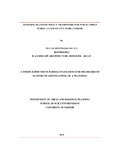| dc.description.abstract | Public urban parks provide environmental, economic and social benefits to the urban
communities. In Kenya their quality over time has deteriorated resulting in
encroachment, lack of attention, poor maintenance, lack of development and under
utilization. Kenya lacks a policy framework for urban park planning and management
but has legislation dealing with their different aspects and components. Existing
loopholes in policy, low priority in planning and management and lack of structured
systems of maintenance and monitoring and evaluation has resulted in their
vulnerability and dilapidation hence exploitation. Furthermore the lack of full
community participation in their planning and management as required by the
Constitution of Kenya has resulted in community resistance to rehabilitation efforts.
This study sought to: evaluate the policy framework that guided the provision of City
Park as a public urban park in Nairobi; to assess effectiveness of the policy
framework with regard to park management of Nairobi City Park; to establish the
place of the community in planning and management of City Park; and to propose
planning interventions that can be embraced for sustainable creation and management
of urban parks such as City Park.
The descriptive study included the use of both primary and secondary data. Purposive
sampling was used to select City Park while embracing a case study approach. The
target research population consisted of the park‟s users, informal and formal traders,
households within City Park‟s neighbourhood, park‟s administration, and relevant
institutions. Random and non-random sampling methods were used to select the
sampling unit while data collection methods involved observation, interviewing and
questionnaire administration.
Study findings derived from collected analysed data indicated that the existing policy
framework alluded to certain aspects and components of urban park planning and
management and that there is low involvement of the community in planning and
management of Nairobi City Park. The study recommends consolidation of existing
policies into a coherent co-ordinated urban park policy framework for planning and
management of urban parks. It further recommends the development of a structured
framework for public participation with regards to urban park planning | en_US |

